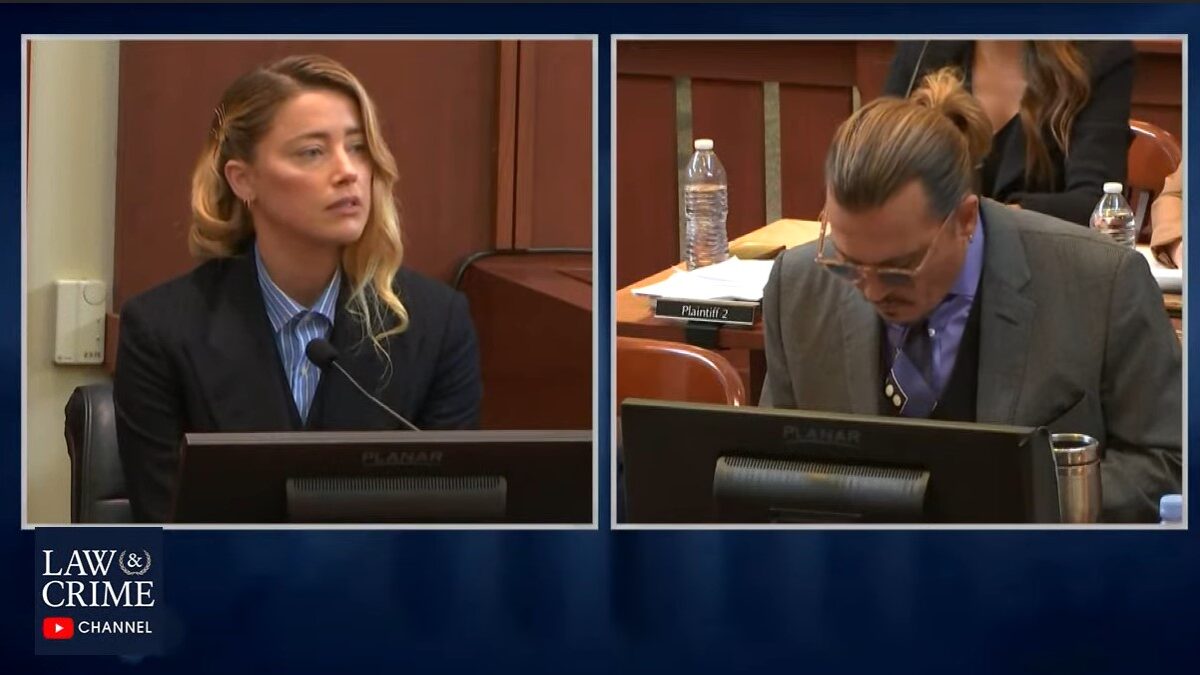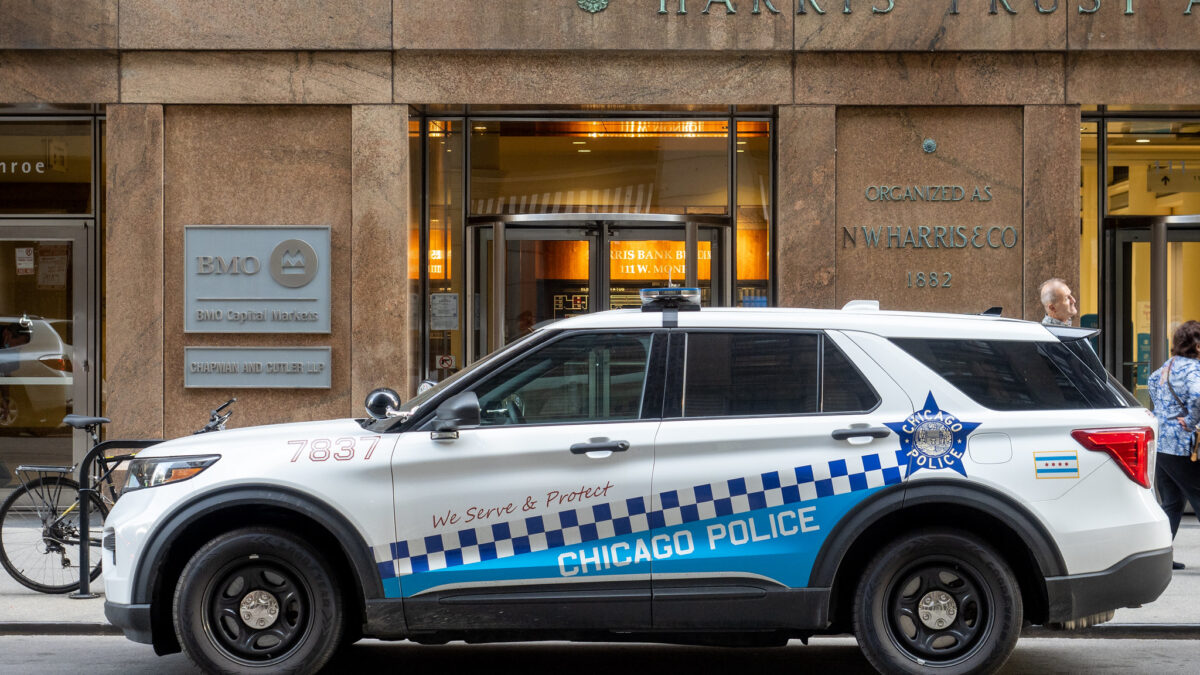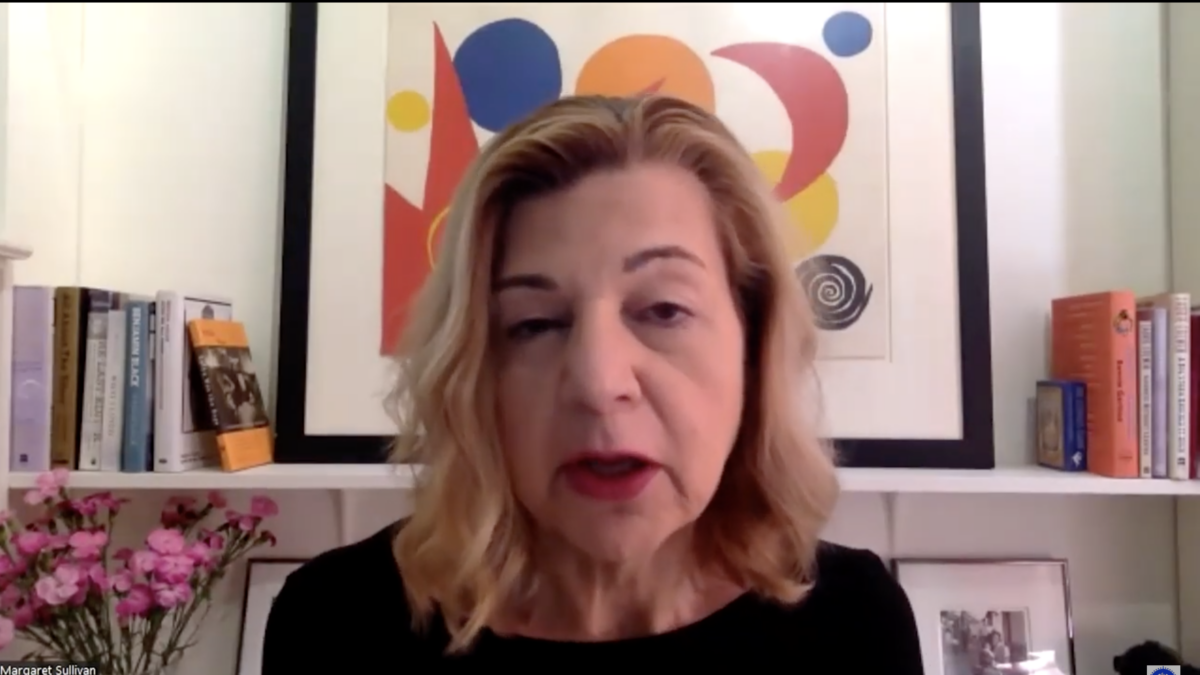According to evidence presented in court, actress Amber Heard lied within the first moment she stepped onto the witness stand last week, saying: “I am here because my ex-husband is suing me for an op-ed I wrote.”
The Washington Post op-ed at the heart of the defamation lawsuit from actor Johnny Depp carried the byline, “By Amber Heard,” and Heard should be held responsible for putting her name on its contents, but the op-ed was anything but written by Heard.
In fact, in a disturbing breach of journalistic and nonprofit ethics, testimony in the tragic trial of Johnny Depp v. Amber Heard reveals Depp should put two other defendants on trial: the American Civil Liberties Union (ACLU) and the Washington Post. The two organizations raise millions of dollars on brand reputations that hinge on values of transparency, honesty, and ethics that they violated in writing and publishing the allegedly defamatory op-ed.
In a carefully orchestrated operation, extensive documentation of which I’ve detailed on Substack, we now know from testimony and email evidence that the communications, “development,” “artist engagement,” and legal teams of the ACLU crafted, wrote, lawyered, and placed the salacious 765-word Washington Post “op-ed” that implied Depp was a wife-beater with a 26-word assertion: “two years ago, I became a public figure representing domestic abuse, and I felt the full force of our culture’s wrath for women who speak out.”
“The ACLU was a co-conspirator with Ms. Heard,” Depp’s attorney, Ben Chew, said during his arguments on Tuesday. “Of course, Mr. Depp chose not to sue them,” responded Heard’s lawyer, Benjamin Rottenborn. Heard’s and Depp’s PR firms didn’t comment further. The ACLU and Washington Post didn’t return several requests for comment.
‘Amber’s Ad’
Two slips-of-the-tongue during the recorded deposition of ACLU Chief Operating Officer Terence Dougherty shared in court reveal exactly how the ACLU and the Washington Post were complicit in a hit job against Depp.
In the first Freudian slip, 14:30:51 into his deposition, Dougherty explained that emails in Exhibit 41 documented ACLU staffers from its fundraising “development” department discussing “the placement of Amber’s ad…”
He quickly tried to correct himself: “Not ad. Sorry. I mean op-ed.”
No, he said it: “the placement of Amber’s ad.”
That’s what the “op-ed” was: “earned media,” as they call it in the media industry, for the ACLU, Heard, and the release of the Warner Bros. film, “Aquaman.”
Then, in the second slip, at 14:40:35 in his deposition, Dougherty explained how Stacy Sullivan, deputy director of editorial and strategic communications at the ACLU from September 2014 through October 2019, according to her LinkedIn account, emailed Michael Larabee, the Post’s op-ed editor and top boss in the opinions section, then Larabee’s colleagues Michael Duffy and Mark Lasswell when she got an automatic out-of-office reply from Larabee.
In the second slip, Dougherty said about Sullivan: “She reached out to him first about placing the ad” from Heard. This time, he didn’t even correct himself.
Phase 1: Building Credibility
Everyone involved in this situation used Depp’s cachet for private gain. The ACLU used Heard’s relationship with Depp to win “earned media,” which is much more lucrative and trustworthy than a paid advertisement. The Washington Post sold newspapers and got clicks. The ACLU got a donation. Heard earned status as a women’s rights activist.
In my 35 years of professional journalism, the last 20 of them writing op-eds, I have never before witnessed a more explicit example of deception. Some years ago, I taught a course on writing the reported op-ed at Georgetown University, and if any of my students had tried to pull off what Heard and the ACLU did, I would have had to fail them for the serious ethical violation of passing off somebody’s work as their own.
Publishing an op-ed that someone else has written for you is no different than going online and buying a term paper. I get it, not everyone is a writer. We all benefit from editors. I’ve used editors and wordsmiths to help me with drafts, but as authors we have an ethical duty to be the ones to first put words down in writing.
But, in the fall of 2018, Heard’s op-ed was the brainchild of communications staffers at the ACLU. The ACLU had published a blog post in August 2016, following Heard’s divorce from Depp, with this positive headline: “Actress Amber Heard Donates Millions to Support the ACLU and Its Work Fighting Violence Against Women.” The page featured a banner image, “Speak Freely.” The tags on the post were “Violence Against Women” and “Women’s Rights.”
In the hallmarks of a pay-to-play operation, Heard had donated $350,000 to the ACLU in August 2016, pledging $3.5 million. Of that, Dougherty testified he believes only $1.3 million was paid, with Depp paying $100,000 and billionaire Elon Musk, who dated Heard after her divorce, attributed to a June 2017 payment of $500,000 and a December 2018 payment of $350,000.
Phase 2: The Proposal
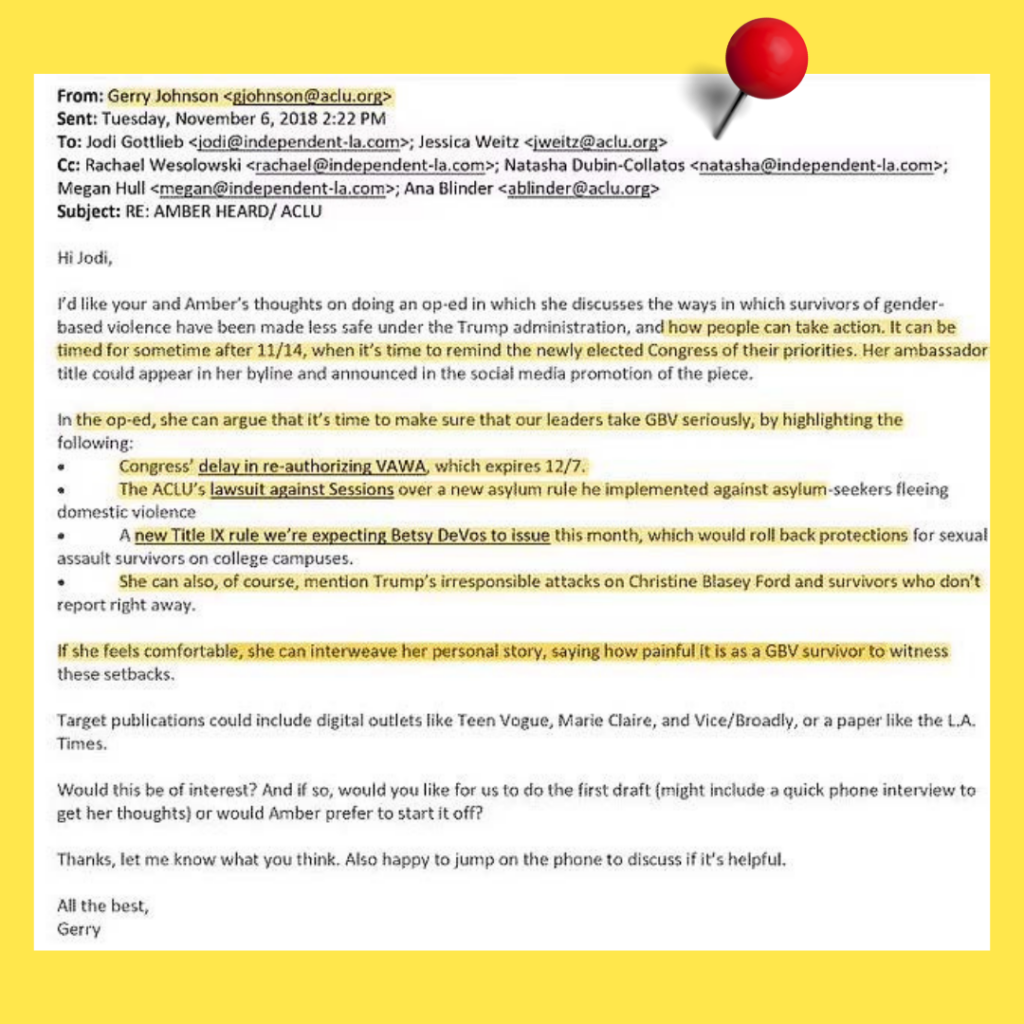
On Nov. 6, 2018, at 2:22 p.m., Gerry Johnson, who according to his LinkedIn was then an ACLU staffer in communications strategy, sent an email to Heard’s publicist at the time, Jodi Gottlieb. It said, “I’d like your and Amber’s thoughts on doing an op-ed in which she discusses the ways in which survivors of gender-based violence have been made less safe under the Trump administration and how people can take action.”
Johnson even framed the piece as depicting Heard as a “gender-based violence,” or GBV, survivor, writing: “If she feels comfortable, she can interweave her personal story, saying how painful it is as a GBV survivor to witness these setbacks.”
Phase 3: The Writing
After her colleague, Johnson, planted this idea, Robin Schulman, a communications strategist at the ACLU, took on the task of writing the “first draft” of the op-ed, according to Dougherty’s testimony and ACLU emails used as exhibits in court.
Over the next 23 days, through Nov. 29, 2018, the ACLU’s communications, legal, and development teams went back and forth with Heard’s PR team and lawyers on the details that would be shared about her relationship with Depp in the op-ed.
That day, Nov. 29, 2018, at 1:12 p.m., Jessica Weitz, director of artist engagement at the ACLU, sent an email to Heard, identified as “A H,” with an attachment, marked as the eighth version of the op-ed, and the subject line, “amber op-ed viii.docx.” She noted the op-ed had to “pass through quite a few lawyer’s [sic] first.”
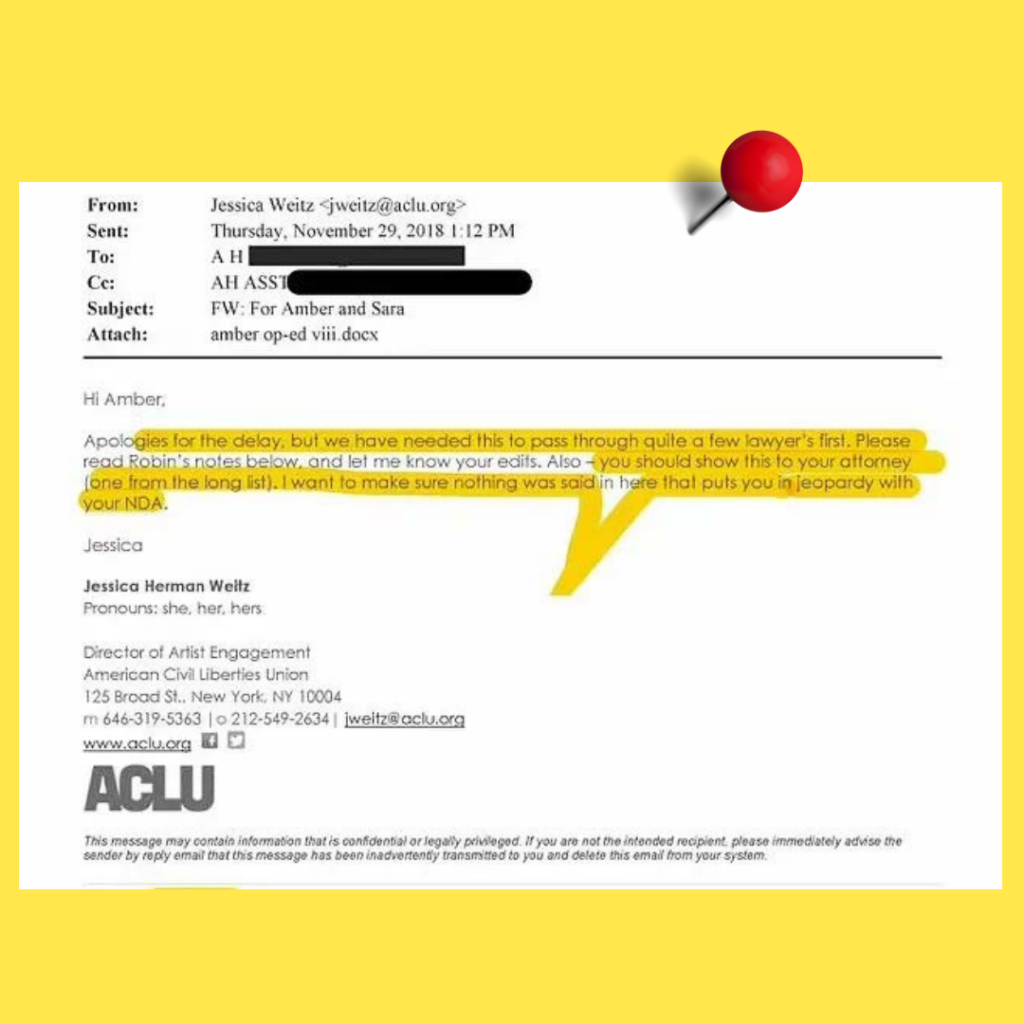
Two hours later, at 3:20 p.m., Schulman sent a new draft of the op-ed to Weitz to forward to Heard with the note: “I tried to gather your fire and rage and really interesting analysis and shape that into op-ed form.” Incredibly, in this game of deception, she said, “I hope it sounds true to you.”
She added, “Your lawyers should review this for the way I skirted around talking about your marriage.” Again, Heard did not even write her own draft.
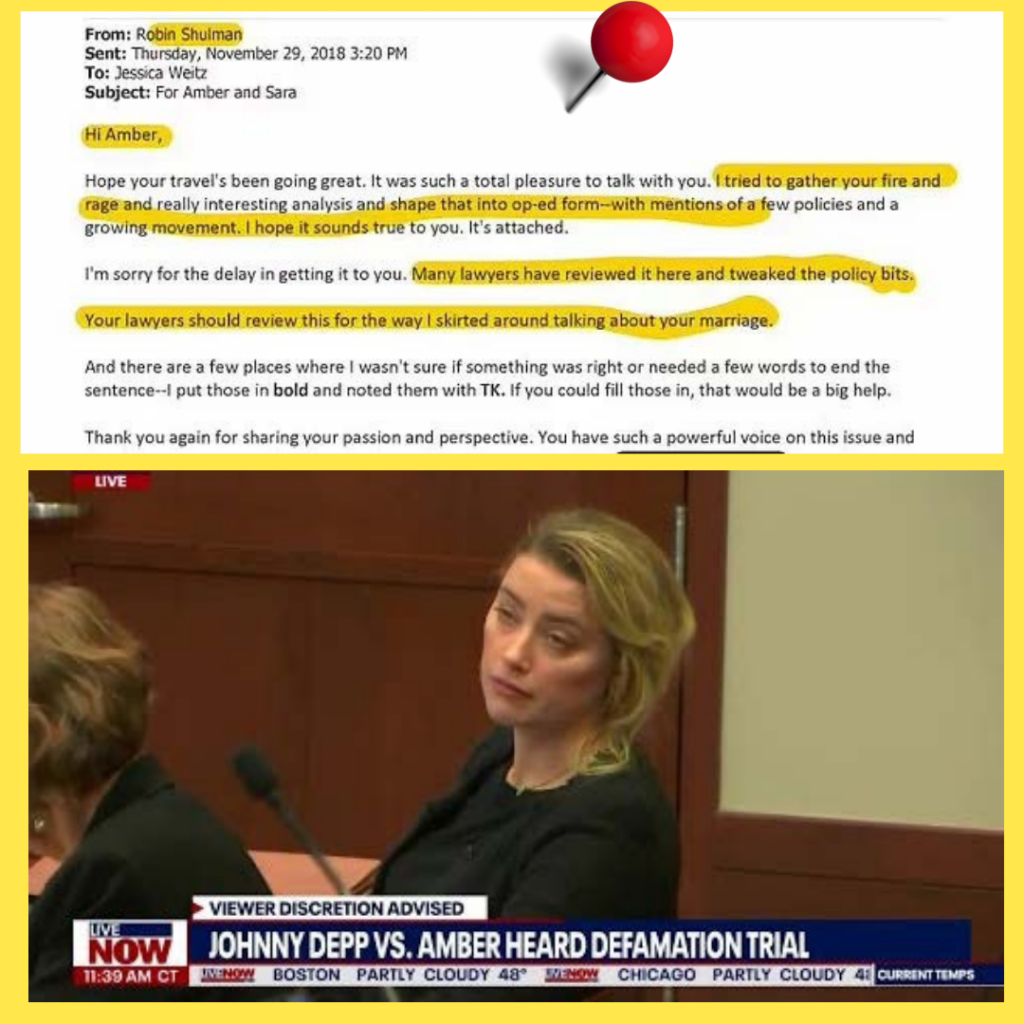
Phase 4: Placing the Hit
From the office of communications strategy at the ACLU, Johnson offered some media outlets to pitch the piece: the Washington Post, the New York Times, USA Today, and Teen Vogue, which has become a go-to for hard-left content.
On Dec. 11, 2018, another 12 days after the first draft was shared and just more than one month since the ACLU first planted the idea of an op-ed, according to a reading of the email in court, it was Weitz who pitched the timing of the op-ed’s placement. In an email, Weitz wrote to the ACLU team: “The goal is to get this out this week to capitalize on the tremendous campaign for Aquaman.” (The emails haven’t been filed yet as court records, but are read on the deposition videos.)
According to court testimony, Weitz also said in an email that Heard wanted to get her temporary restraining order into the op-ed. “Is there an artful way to do that?” Weitz asked.
It was left to the ACLU’s Sullivan to pitch the op-ed. According to Dougherty’s deposition, she emailed the pitch to Larabee and others at the Washington Post.
Starting off with casual familiarity, she punctuated her pitch with a juicy parenthetical phrase: “Hey Michael, wondering if we might interest you in a piece by Amber Heard (who as you may recall, was beaten up during her brief marriage to Johnny Depp), on what the incoming Congress can do to help protect women in similar situations.” She just slipped in that serious allegation about Depp.
When Sullivan got an out-of-office reply, she forwarded the pitch to Duffy and Lasswell at the Post. After the Post accepted the op-ed, according to court testimony Weitz celebrated, writing in an email: “It’s going to the Washington Post!!!”
Then on Dec. 17, 2018, in an email with the subject line, “Re: Language – TIME SENSITIVE,” the ACLU’s Shulman continued to massage the op-ed with Heard’s attorney, Eric George. “A H” was just on the “CC” line, copied in the messages.
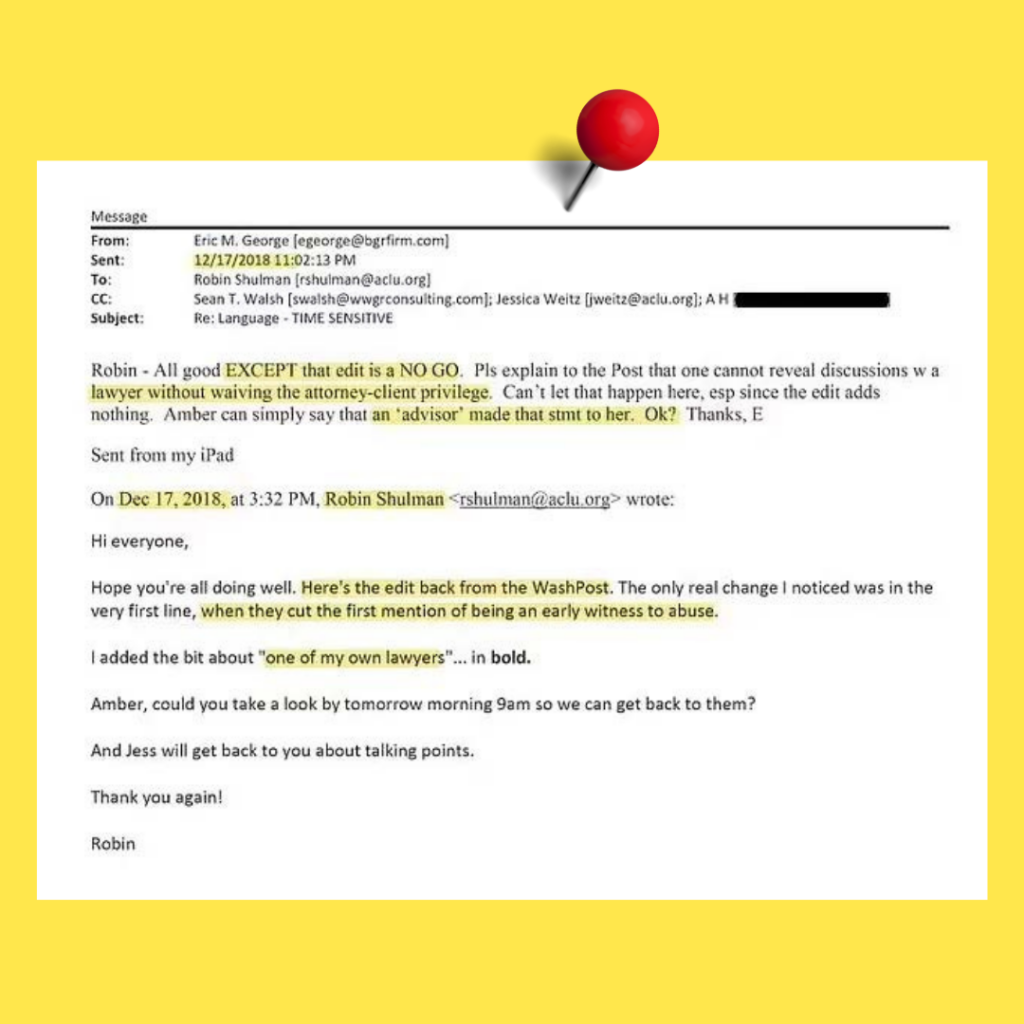
Phase 5: The Hit
The next day, Dec. 18, 2018, the Washington Post published an op-ed in its “Opinions” section with the headline: “Amber Heard: I spoke up against sexual violence – and faced our culture’s wrath. That has to change.” It included the words crafted artfully and deliberately by the team at the ACLU: “I became a public figure representing domestic abuse, and I felt the full force of our culture’s wrath for women who speak out.”
Larabee, Duffy, and Lasswell should have all known better. Getting a pitch from the deputy director of editorial and strategic communications at the ACLU is a huge red flag that they wrote the piece. Did the Washington Post editors even ask?
It was reckless, irresponsible, and defamatory to imply without a conviction that Depp had been a domestic violence abuser. That’s journalism 101. And Heard, the ACLU, and the Washington Post are responsible for the headline that ran, alleging “sexual violence.”
No matter the verdict of the case, they need to fix their misconduct. To right their wrongs, they should do three things: apologize to Depp for publishing the fake “op-ed” that wasn’t even written by Heard, retract the “op-ed,” and donate to charities that actually fight domestic violence.
In 2011, the UK’s Guardian published an op-ed headlined, “The ghostwritten op-ed: an unacceptable deception.” Author Dan Gillmor asked: “If I’d fail a journalism student for a paper written by another, why does the media give a pass to the rich and powerful?”
It’s that same breach of trust the ACLU and Washington Post are silent about today. We don’t need closing arguments in the case against Heard to issue a verdict on the unethical breach of the public trust by these two institutions of power. Guilty.
